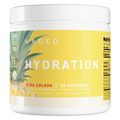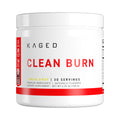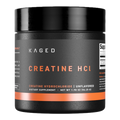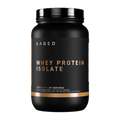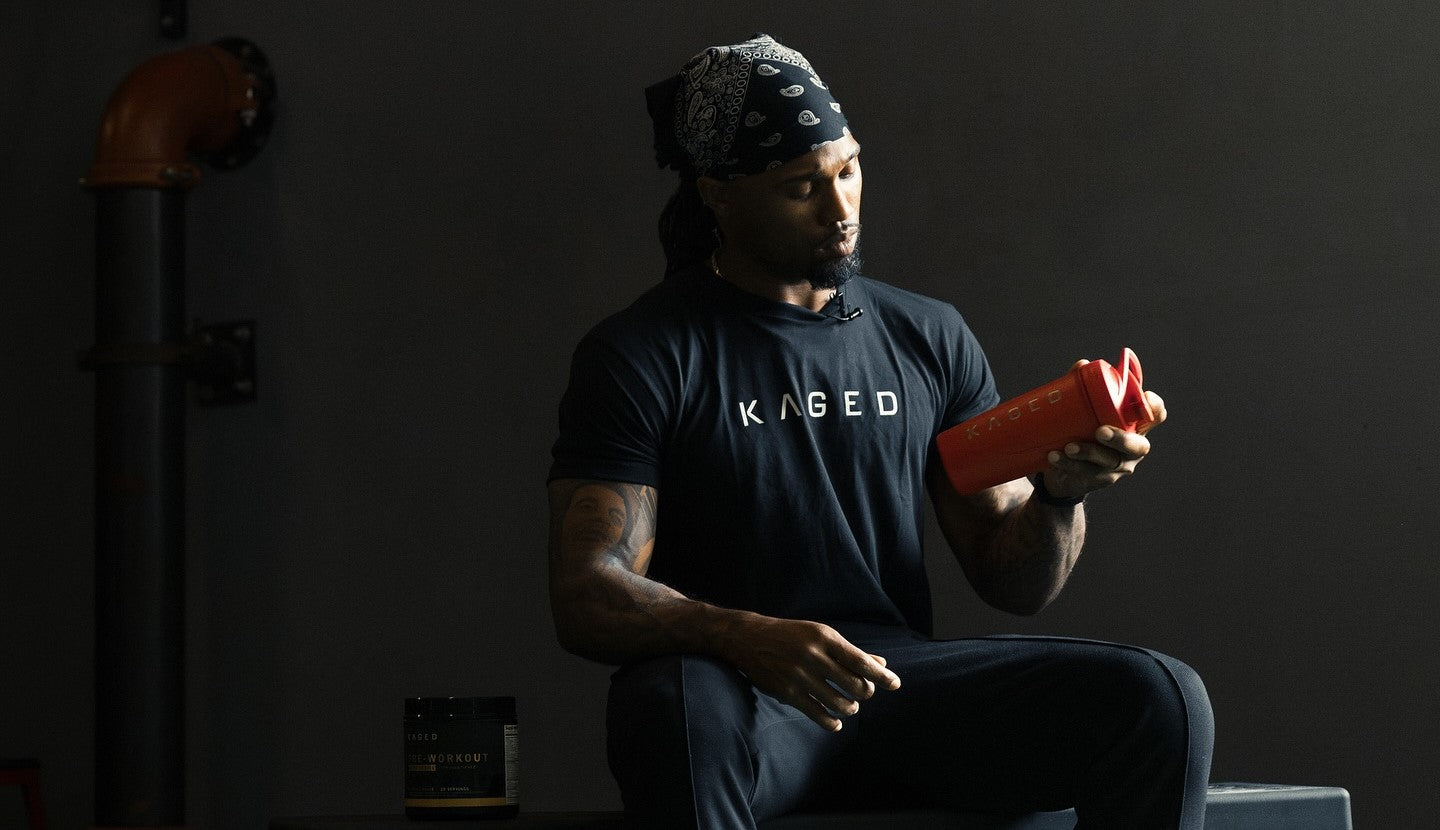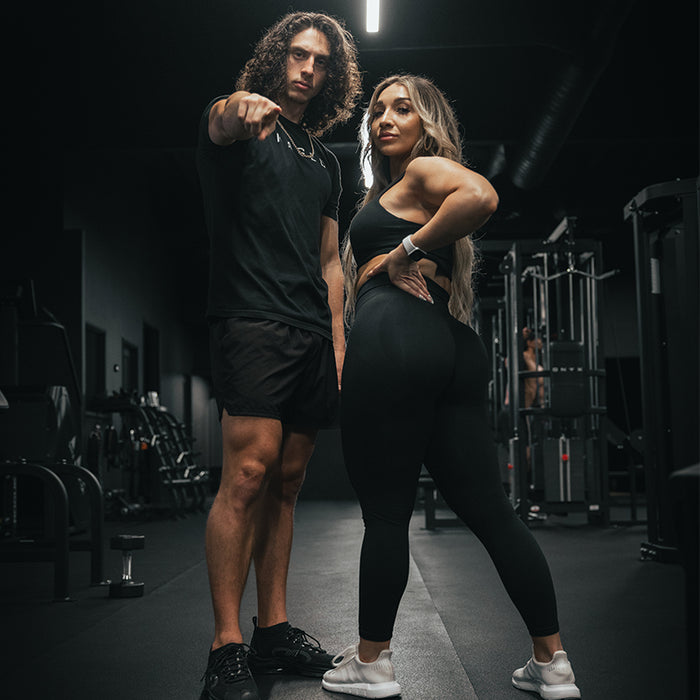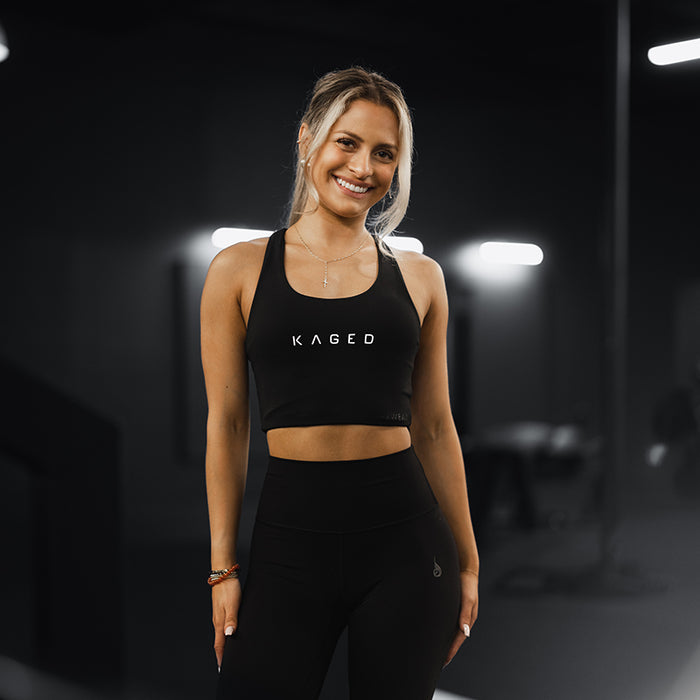If you’re going to take a pre-workout, you want to make sure it has ingredients that will actually support your performance.
One of the big problems in the supplement industry is that, instead of focusing on performance and results, pre-workouts focus on candy flavors, bright bottles, and formulas that make it sound like they’re doing something.
The solution is to know what ingredients have real backing behind them and at what doses. Then look for pre-workouts that accomplish that.
Let’s get into the ingredients you should look for in your pre-workout.
Quick List: The Best Pre-Workout Ingredients to Support Performance
Here are the best pre-workout ingredients to support strength, endurance, pumps, focus, and overall workout performance:
-
Caffeine (preferably organic): Enhances energy, focus, and power output.
-
L-Citrulline (not Citrulline Malate): Boosts nitric oxide for better blood flow and muscle pumps.
-
CarnoSyn® Beta-Alanine: Improves muscular endurance and helps buffer fatigue.
-
Betaine (preferably BetaPower®): Supports strength, power, and hydration at the cellular level.
-
Creatine: Increases strength, muscle size, and training performance when taken consistently. Although if you take it another time of day, that works just as well.
Bonus ingredients like BCAAs, nootropics (e.g., Alpha-GPC), or electrolytes can further tailor your pre-workout to your goals.
But the ingredients above should form the foundation of any top-tier formula.
1. Caffeine (Preferably Organic)
Let’s be clear: caffeine supports performance.
It’s one of the most well-researched ingredients in sports nutrition, shown to increase energy, enhance focus, boost strength, and improve endurance. Caffeine works by blocking adenosine receptors in the brain, helping you feel more alert while also increasing dopamine and adrenaline levels.
Research suggests that caffeine can improve power output, reduce perceived exertion, and delay fatigue, making it a cornerstone of any effective pre-workout formula. Whether you’re lifting heavy, hitting a high-intensity interval session, or grinding through endurance work, caffeine can give you a clear edge.*
The dose to look for depends on your goals, time of day, and caffeine tolerance. You can learn more about this in our article on how to find the optimal caffeine dose for you.
At Kaged, we distinguish ourselves by using PurCaf® Organic Caffeine sourced from green coffee beans, instead of synthetic caffeine.
It’s ideal for athletes and high performers who want consistent, reliable energy they can feel good about.
With that said, if you train at night, you’ll want to skip out on the caffeine and choose a stimulant-free option.
2. L-Citrulline (NOT Citrulline Malate)
If you want better muscle pumps, endurance, and recovery, L-citrulline is one of the best ingredients to look for in a pre-workout.
Once ingested, L-citrulline is converted into L-arginine in the kidneys, which then increases nitric oxide (NO) production. Higher NO levels help widen blood vessels, allowing more oxygen and nutrients to reach your muscles.
Many pre-workouts use citrulline malate, a blend of citrulline and malic acid. While this might sound similar, it’s important to know what you’re actually getting. As we break down in our full guide to L-Citrulline vs. Citrulline Malate:
-
L-Citrulline Has Twice as Much Citrulline by Volume: Citrulline malate is usually a 1:1 blend of citrulline and malate. So, if a product lists 2 grams of citrulline malate, you’re only getting about 1 gram of pure citrulline—the rest is malic acid.
-
This means that you need double the amount of citrulline malate to match the citrulline content of pure L-citrulline. Many formulas underdose citrulline malate, meaning you’re not actually getting an effective amount of citrulline to boost nitric oxide production.
For best results, look for a minimum of 3 grams of pure L-citrulline per serving, which is the amount commonly used in studies to support endurance, pumps, and performance. Our pre-workouts start at 3.5g and go up to 10g of pure L-citrulline.

3. CarnoSyn® Beta-Alanine
Beta-alanine is another powerhouse ingredient you’ll find in the best pre-workouts. It's a precursor to carnosine, a compound that helps buffer acid in your muscles during high-intensity exercise.
By increasing muscle carnosine levels, beta-alanine helps delay the buildup of lactic acid, allowing you to push through more reps, sustain intensity longer, and fight off fatigue.*
In practical terms, this means beta-alanine can support better endurance, improved performance in repeated bouts of exercise, and greater training volume over time. It’s especially effective for workouts lasting between 1 and 4 minutes, such as weight training sets, CrossFit-style circuits, or interval training.
At Kaged, we use CarnoSyn® Beta-Alanine, the form that’s backed by the most research in athletes. CarnoSyn® ensures that you get the quality and dosing shown to deliver real performance benefits.
The classic tingling sensation some people feel after taking beta-alanine—called paresthesia—is normal and temporary. It’s simply a sign that the ingredient is active in your system.
For best results, look for pre-workouts that provide an effective daily dose of around 3.2 grams of CarnoSyn® beta-alanine, either in a single serving or split across multiple doses throughout the day.
4. Betaine
Betaine, also known as trimethylglycine (TMG), is a naturally occurring compound found in foods like beets and spinach.
In the context of pre-workout supplementation, betaine has been shown to support strength, power, and muscular endurance, making it a valuable addition to a well-rounded formula.*
One of betaine’s key roles is supporting cellular hydration. It acts as an osmolyte, helping cells maintain fluid balance under stress. This can lead to better muscle fullness, improved endurance, and enhanced performance during tough training sessions. Several studies have also linked consistent betaine supplementation to increases in strength, power output, and body composition improvements when combined with resistance training. In one study, for example, participants took 2.5g of BetaPower® betaine, the exact dose and form used in Kaged Pre-Workout. The BetaPower® betaine group showed an increase in squat repetitions over the placebo group after 14 days.*
At Kaged, we use BetaPower®, a patented, research-backed form of betaine sourced from sugar beets. BetaPower® is standardized for purity and potency, ensuring you’re getting the same ingredient that’s been shown to support performance.
For best results, look for pre-workouts that provide around 2.5 grams of betaine, the dose commonly used in research to deliver meaningful performance benefits.
5. Creatine
Creatine is one of the most studied and effective supplements for increasing strength, muscle size, and training performance. It works by increasing your muscles’ stores of phosphocreatine, which helps regenerate ATP during short, intense bursts of activity like lifting heavy weights or sprinting.
This translates to better power output, more reps at a given weight, and greater muscle growth over time.
You don’t need to have creatine in your pre-workout. However, you absolutely should take creatine. The research on creatine shows that timing isn’t as important as consistency. What matters most is taking it daily to keep your muscle stores saturated.
That said, having creatine included in your pre-workout can make your daily routine easy.
At Kaged, we have pre-workouts that have 0g, 1.5g, 3g, and 5g of creatine. This allows you to adjust depending on how much creatine you need and whether you consume creatine from other sources.
Everything Else is a Bonus, Depending on Your Goals
Those are the big five. Now, there are lots of other ingredients that absolutely have their place. Kaged Pre-Workout Elite, our most advanced pre-workout, has 21 ingredients for a reason.

Looking for extra muscle support and recovery? Take a pre-workout with BCAAs, or add them.
Looking for extra focus for long workouts? Look for nootropics ingredients in your pre-workout like Alpha-GPC.
Want to ensure you get hydration alongside performance? Look for electrolytes in your pre-workout, which we add to Kaged Pre-Workout Sport.
What to Avoid in a Pre-Workout
Not every ingredient you see on a label is there to support your performance. Some are added for marketing appeal, flavor, or to create a sensation that feels like the product is working, without actually delivering real results. Here are a few ingredients and practices to watch out for:
1. Proprietary Blends
Proprietary blends list ingredients without disclosing their exact amounts. This makes it impossible to know whether you’re getting research-backed doses or just trace amounts for label decoration. Always look for fully transparent labels that show exact dosages for each ingredient.
2. Excessive Stimulants
While caffeine has clear performance benefits, some formulas overload their products with multiple stimulants, like yohimbine, synephrine, or large caffeine stacks—which can lead to jitters, anxiety, crashes, and sleep disruption.
Some people can benefit from the high doses of caffeine. But more isn’t always better.
3. Underdosed Key Ingredients
Many pre-workouts list great ingredients on the label but don’t use enough to actually be effective. For example, citrulline malate at 2–3 grams or beta-alanine at 1 gram won’t give you the benefits seen in research. If you don’t see effective doses listed clearly, that’s a red flag.
4. Unnecessary Fillers and Artificial Colors
Bright neon colors and artificial dyes don’t improve your performance—they just make the powder look flashy.
What Else to Look For in a Pre-Workout
It’s not just about ingredients. Depending on your goals, caffeine tolerance, budget, and preferences, the right pre-workout for you won’t be the same as the right pre-workout for somebody else. Learn the 8 factors to consider when choosing a pre-workout.
Frequently Asked Questions About Pre-Workout Ingredients
1. What are the most important ingredients in a pre-workout?
The most important pre-workout ingredients are caffeine, L-citrulline, CarnoSyn® beta-alanine, BetaPower® betaine, and creatine. These ingredients are backed by research to support energy, endurance, blood flow, strength, and overall workout performance. Bonus ingredients like electrolytes, BCAAs, or nootropics can further tailor your pre-workout to your specific goals.
2. Is caffeine necessary in a pre-workout?
Caffeine is one of the most effective pre-workout ingredients for increasing energy, focus, strength, and endurance. However, it’s not absolutely required—especially if you train at night or are sensitive to stimulants. In that case, a stim-free pre-workout with ingredients like L-citrulline, beta-alanine, and betaine can still deliver excellent performance benefits.
3. What’s the difference between L-citrulline and citrulline malate?
L-citrulline is the pure form of citrulline, while citrulline malate is a blend of citrulline and malic acid. Most citrulline malate is in a 1:1 ratio, meaning you’re only getting about half the actual citrulline by weight. For example, 6 grams of citrulline malate typically contains only 3 grams of citrulline. That’s why pure L-citrulline at 6 grams or more is preferred for better pumps and endurance. Read our full comparison here.
4. Do I need beta-alanine in my pre-workout?
Beta-alanine isn’t essential, but it’s one of the most effective ingredients for improving muscular endurance and buffering fatigue during high-intensity exercise. Look for pre-workouts that use CarnoSyn® beta-alanine at the clinically studied 3.2-gram dose for the best results.
5. Is creatine better to take before or after a workout?
Research shows that the timing of creatine isn’t as important as daily consistency. You can take it pre-workout, post-workout, or any other time of day—the key is making sure your muscles stay saturated with creatine over time. Including it in your pre-workout simply makes it easier to remember to take it consistently.
6. What ingredients should I avoid in a pre-workout?
Avoid pre-workouts that use proprietary blends, under-dosed key ingredients, excessive stimulants, or unnecessary fillers and artificial colors. These are often signs of a formula that prioritizes marketing over actual performance.
7. How do I know if a pre-workout is high quality?
Look for pre-workouts that use clinically studied ingredients at effective doses, list transparent labels with exact amounts, and use trusted, patented forms like PurCaf® (caffeine), CarnoSyn® (beta-alanine), BetaPower® (betaine), and high-quality creatine monohydrate. Also, consider your goals, caffeine tolerance, and training style. Here’s a guide to choosing the right pre-workout for you.
*These statements have not been evaluated by the FDA. This product is not intended to diagnose, treat, cure, or prevent any disease.
